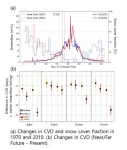(Press-News.org) LA JOLLA, CA—A clinical trial carried out at Scripps Research has shown that apremilast, approved by the U.S. Food and Drug Administration (FDA) for the treatment of psoriasis, cuts alcohol intake by more than half in people with severe alcohol use disorder (AUD). Collaborators at Oregon Health and Science University (OHSU) and other institutions also showed that, in mice, apremilast boosts activity in an area of the brain known to be involved in AUD.
The research was published online ahead of print by the Journal of Clinical Investigation on January 19, 2023.
“We’re incredibly excited to have found a drug that has such a large effect size on alcohol consumption, and with such good tolerability and safety at the same time,” says co-senior author Barbara Mason, PhD, the Pearson Family Chair and Director of the Pearson Center for Alcohol and Addiction Research at Scripps Research.
About 29.5 million Americans meet the criteria for AUD, which encompasses the conditions known as alcohol abuse, alcohol dependence and alcohol addiction. Fewer than 10% of people with the disorder get any treatment, and an even smaller number are prescribed medication to treat AUD.
Mason is the director of the Translational Opportunities group for the Integrative Neuroscience Initiative on Alcoholism-NeuroImmune (INIA-NeuroImmune), a multidisciplinary, collaborative consortium funded by the National Institute on Alcohol Abuse and Alcoholism (NIAAA) to study the underlying biology of alcohol use disorder. In her role with INIA-NeuroImmune, Mason reviews research conducted by basic scientists in the consortium, and then identifies the most promising drug candidates for clinical trials.
INIA-NeuroImmune collaborators pinpointed apremilast—sold under the brand name Otezla®—as a drug with the potential to treat AUD. The drug was known to block a molecule known as PDE4, which plays important roles in both immune and brain cell function. While its use in treating psoriasis is due to its immune function, basic scientific studies in mice had suggested that blocking PDE4 in the brain could reduce alcohol intake.
Mason launched a phase 2 trial, carried out entirely at the Pearson Center for Alcoholism and Addiction Research at Scripps Research, to study apremilast in humans. Among available PDE4 inhibitor medications, Mason chose apremilast because it had fewer of the gastrointestinal side effects associated with earlier PDE4 inhibitors such as rolipram or ibudalast. The trial enrolled 51 paid adult volunteers with severe AUD, none of whom were actively trying to consume less alcohol. For 14 days, each person took a daily pill of either apremilast or a placebo.
On average, participants consumed about five alcoholic drinks per day at the start of the study. People who received the placebo still drank nearly five drinks each day, while those who took apremilast reduced their alcohol intake to only about two drinks per day. In addition, apremilast decreased the percent of days that participants were classified as “heavy drinkers.” People who took apremilast reported anecdotally that they felt little impulse to drink and lacked the desire for alcohol that they usually had. Moreover, the drug was well tolerated with no participants discontinuing treatment due to gastrointestinal side effects.
“In this study, we saw that apremilast worked in mice. It worked in different labs, and it worked in people. This is incredibly promising for treatment of addiction in general,” says co-senior author Angela Ozburn, PhD, associate professor of behavioral neuroscience in the OHSU School of Medicine and a research biologist with the Portland VA Health Care System.
“Even with drugs currently approved by the FDA for alcohol use disorder, we usually see smaller effect sizes,” says Mason. “It’s very unusual to get results like this, particularly in a severely affected population. This will need to move to larger, broader clinical trials now, but with this study, I think we’ve shown that this is an incredibly promising drug for alcohol use disorder.”
In addition to Mason and Ozburn, authors of the study, “Pre-clinical and clinical evidence for suppression of alcohol intake by apremilast,” are Alan Beneze, Jessica Bess, Jenny Miller, Susan Quello, Amanda J. Roberts, Marisa Roberto, Farhad Shadan and Michael Skinner of Scripps Research; John C. Crabbe, Evan J. Firsick, Kolter B. Grigsby, Pamela Metten and Kayla G. Townsley of Oregon Health & Science University; Heather C. Aziz, Regina A. Mangieri and Richard A. Morrisett of The University of Texas at Austin; Howard C. Becker and Marcelo F. Lopez of Medical University of South Carolina; Toby K. Eisenstein and Joseph J. Meissler of Temple University; and John M. Light of Oregon Research Institute.
This work was supported by funding from the National Institutes of Health (AA016651, AA013519, AA010760, AA07468, and AA027692, U01 AA013498, DA013429, P60AA06420 U01AA025476); the US Department of Veterans Affairs Grants (BX000313, BX004699, and IK2 BX002488), and a gift from the John R. Andrews Family.
About Scripps Research
Scripps Research is an independent, nonprofit biomedical institute ranked one of the most influential in the world for its impact on innovation by Nature Index. We are advancing human health through profound discoveries that address pressing medical concerns around the globe. Our drug discovery and development division, Calibr, works hand-in-hand with scientists across disciplines to bring new medicines to patients as quickly and efficiently as possible, while teams at Scripps Research Translational Institute harness genomics, digital medicine and cutting-edge informatics to understand individual health and render more effective healthcare. Scripps Research also trains the next generation of leading scientists at our Skaggs Graduate School, consistently named among the top 10 US programs for chemistry and biological sciences. Learn more at www.scripps.edu.
END
Immune system drug shows promise in treating alcohol use disorder, a Scripps Research clinical trial reports
Scientists at Scripps Research found that apremilast (Otezla®) can reduce alcohol intake by more than half in people with severe alcohol use disorder.
2023-02-28
ELSE PRESS RELEASES FROM THIS DATE:
$10 million grant funds Scripps Research Alcohol Research Center through its 50th year
2023-02-28
LA JOLLA, CA—The National Institute on Alcohol Abuse and Alcoholism (NIAAA) has awarded scientists at Scripps Research a $10 million grant to study the cellular and molecular changes in the brain that underlie alcohol use disorder (AUD). The grant will fund the Scripps Research Alcohol Research Center (TSRI-ARC) for five years, carrying the research into its 50th year of consecutive NIAAA funding—first beginning in 1977.
“A lot of exciting things have happened in the AUD field over the last 45 years, and the center has been at the forefront of many of them,” ...
First study to show childhood obesity is linked to increased risk of four of the five newly proposed subtypes of adult-onset diabetes
2023-02-28
New research published in Diabetologia (the journal of the European Association for the Study of Diabetes [EASD]) is the first study to show that childhood obesity is associated with an increased risk of four of the five recently proposed subtypes of adult-onset diabetes. The study is by Yuxia Wei, Institute of Environmental Medicine, Karolinska Institutet, Stockholm, Sweden, and colleagues.
In 2018, a ground-breaking study identified five novel subtypes of adult-onset diabetes: severe autoimmune diabetes (SAID, including type 1 diabetes and latent autoimmune diabetes in adults [LADA]) and four ...
Pakistan streamflow timing will become three times faster by end of century
2023-02-28
Nature has remained in balance for a long time, but climate change due to modern human activities is disrupting the balance of the natural system. The disruption makes it more difficult for humans – who must work with nature to survive – to predict the future. Moreover, developing countries with limited understanding and preparation for climate change are more vulnerable to climate change-driven social and economic damage. Recently, a research team from POSTECH corrected the biases of future regional climate model projection data to ...
Forgoing one food treats eosinophilic esophagitis as well as excluding six
2023-02-28
Eliminating animal milk alone from the diet of adults with eosinophilic esophagitis, or EoE, is as effective at treating the disease as eliminating animal milk plus five other common foods, a clinical trial funded by the National Institutes of Health has found. For people with EoE whose disease remains active after they forgo animal milk, a more restrictive diet may help them achieve remission, according to the researchers. These findings were published today in the journal The Lancet Gastroenterology & Hepatology.
“Diet-based therapy for eosinophilic esophagitis will be much ...
Are our pets leaking information about us?
2023-02-28
Are our pets leaking information about us?
Pet and animal-related apps are creating cybersecurity risks to their owners, new research has shown.
While being able to trace your cat and dog may be an attractive benefit to many pet owners as it can provide peace of mind, allowing a third party to track your movements may be much less attractive.
Computer scientists at Newcastle University and Royal Holloway, University of London have exposed multiple security and privacy issues by evaluating 40 popular Android apps for pets and other companion animals as well as farm animals. The results show that several of these apps ...
Experts demand fire safety policy change over health impact of widely used flame retardants
2023-02-28
Leading environmental health experts have called for a comprehensive review of the UK's fire safety regulations, with a focus on the environmental and health risks of current chemical flame retardants.
The health dangers of substances meant to improve fire safety have prompted experts to demand a range of new measures to reduce risk.
Flame retardants are widely used to slow down or stop the spread of fire. They are used regularly in a range of products – from sofas and textiles, to building materials. However, hundreds of studies have reported on the adverse effects of these chemicals, many of which are bioaccumulative and have been linked ...
Loneliness is central to perinatal depression
2023-02-28
Loneliness can often contribute to depression in expectant and new mothers, finds a new review of evidence led by UCL researchers.
The researchers say people working with expectant mothers, such as in antenatal classes or consultations, should be aware of the importance of loneliness and the value of encouraging new mothers to develop and maintain good social connections. The findings suggest that increased support from family and healthcare professionals can be helpful in reducing the mental health impacts of loneliness.
Published in BMC Psychiatry, the meta-synthesis (an evidence review using a systematic ...
Obesity in pregnant women could alter the structure and function of the placenta increasing the risk of poor health outcomes for both mother and baby
2023-02-28
Maternal obesity alters the structure of the placenta (a vital organ that nourishes the baby during pregnancy) more than gestational diabetes mellitus (GDM; a condition is diagnosed by poor glucose control in pregnancy). The new insight, published in The Journal of Physiology, enhances understanding about the mechanisms underlying poor pregnancy outcomes and the subsequent greater risk of poor neonatal and offspring health. The identification of specific changes in the placenta could lead to the potential development ...
Australia’s rarest bird of prey disappearing at alarming rate
2023-02-28
Australia’s rarest bird of prey - the red goshawk - is facing extinction, with Cape York Peninsula now the only place in Queensland known to support breeding populations.
PhD candidate Chris MacColl from The University of Queensland’s School of Earth and Environmental Sciences led the research project that made the discovery and was shocked by the hawk’s dwindling numbers.
“Over four decades the red goshawk has lost a third of its historical range, which ...
Local leaders announce plan to strengthen health services in Imperial County
2023-02-28
Representatives from the City of El Centro, El Centro Regional Medical Center (ECRMC), and UC San Diego Health today announced a strategic and operational plan to stabilize and financially bolster ECRMC, as well as the greater network of Imperial County hospitals.
Under the proposed 12- to 18-month plan, UC San Diego Health will assume full day-to-day operational, clinical and financial management of ECRMC while Preston Hollow Community Capital (PHCC), the majority bondholder for ECRMC, will provide financial and other resources to ECRMC for ...
LAST 30 PRESS RELEASES:
Korea University, Stanford University, and IESGA launch Water Sustainability Index to combat ESG greenwashing
Molecular glue discovery: large scale instead of lucky strike
Insulin resistance predictor highlights cancer connection
Explaining next-generation solar cells
Slippery ions create a smoother path to blue energy
Magnetic resonance imaging opens the door to better treatments for underdiagnosed atypical Parkinsonisms
National poll finds gaps in community preparedness for teen cardiac emergencies
One strategy to block both drug-resistant bacteria and influenza: new broad-spectrum infection prevention approach validated
Survey: 3 in 4 skip physical therapy homework, stunting progress
College students who spend hours on social media are more likely to be lonely – national US study
Evidence behind intermittent fasting for weight loss fails to match hype
How AI tools like DeepSeek are transforming emotional and mental health care of Chinese youth
Study finds link between sugary drinks and anxiety in young people
Scientists show how to predict world’s deadly scorpion hotspots
ASU researchers to lead AAAS panel on water insecurity in the United States
ASU professor Anne Stone to present at AAAS Conference in Phoenix on ancient origins of modern disease
Proposals for exploring viruses and skin as the next experimental quantum frontiers share US$30,000 science award
ASU researchers showcase scalable tech solutions for older adults living alone with cognitive decline at AAAS 2026
Scientists identify smooth regional trends in fruit fly survival strategies
Antipathy toward snakes? Your parents likely talked you into that at an early age
Sylvester Cancer Tip Sheet for Feb. 2026
Online exposure to medical misinformation concentrated among older adults
Telehealth improves access to genetic services for adult survivors of childhood cancers
Outdated mortality benchmarks risk missing early signs of famine and delay recognizing mass starvation
Newly discovered bacterium converts carbon dioxide into chemicals using electricity
Flipping and reversing mini-proteins could improve disease treatment
Scientists reveal major hidden source of atmospheric nitrogen pollution in fragile lake basin
Biochar emerges as a powerful tool for soil carbon neutrality and climate mitigation
Tiny cell messengers show big promise for safer protein and gene delivery
AMS releases statement regarding the decision to rescind EPA’s 2009 Endangerment Finding
[Press-News.org] Immune system drug shows promise in treating alcohol use disorder, a Scripps Research clinical trial reportsScientists at Scripps Research found that apremilast (Otezla®) can reduce alcohol intake by more than half in people with severe alcohol use disorder.



